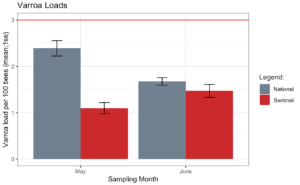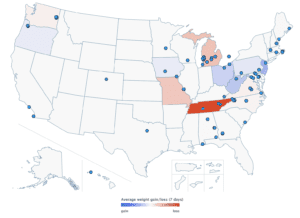We’re here to help you beat the heat with your second monthly Sentinel Monthly Memo of the year. It has been hotter than Hades out there, so hopefully you and your bees are keeping cool. We’re another month into the 2019 Sentinel Apiary Program, and here’s what we’re seeing.
In the month of June, we received a record 417 samples from 70 Sentinel Apiaries in 28 states. To put that into perspective, that’s over 125,000 bees, enough to comprise 2-3 full colonies. Our undergraduate lab technicians are certainly being put to good use!
Congratulations to the state with the lowest June mite load: New Hampshire with 0 mites! Mite loads continue to be higher in the South, with North Carolina, Georgia, Louisiana, Alabama, and Arizona above treatment threshold. Be sure to check out our interactive Varroa map to see mite loads at the county level. For the first two months of the program, Sentinel Apiaries have had lower average mite loads than the National Average (via APHIS NHBDS). We hope to continue this trend for the rest of the season!

A couple of other fun superlatives we will begin awarding each month: the state with biggest bees was also New Hampshire with an average of 0.196 grams per bee. For context, the average bee weight was 0.173 grams.
The state that submitted the most samples was Michigan with a whopping 68 samples.
The state that submitted the most drones total was also Michigan with 369 drones. The state with the most drones per sample was New York with an average of 24 drones per sample. Sorry boys!
It’s also peak honey flow season, and we can’t wait to see how much sweet stuff our Sentinel participants pull in. Be sure to check out our hive scale map to see how your state is stacking up in honey production! And remember, as soon as you get those supers off you should monitor and apply a Varroa treatment if needed. Be careful to choose a treatment with a generous temperature threshold as it’s too hot for a few of the most popular chemicals. The Honey Bee Health Coalition has great resources to help you choose a safe product.

That’s all for this month, we’ll be back in August with another update. Stay cool out there and Happy Beekeeping!